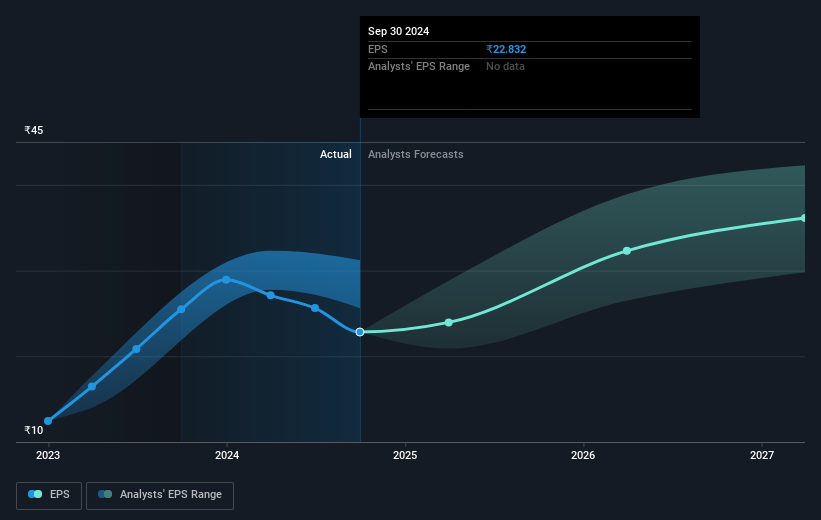- India
- /
- Auto Components
- /
- NSEI:APOLLOTYRE
Apollo Tyres (NSE:APOLLOTYRE) sheds 6.7% this week, as yearly returns fall more in line with earnings growth

The worst result, after buying shares in a company (assuming no leverage), would be if you lose all the money you put in. But on a lighter note, a good company can see its share price rise well over 100%. One great example is Apollo Tyres Limited (NSE:APOLLOTYRE) which saw its share price drive 194% higher over five years. It's down 6.7% in the last seven days.
While this past week has detracted from the company's five-year return, let's look at the recent trends of the underlying business and see if the gains have been in alignment.
Check out our latest analysis for Apollo Tyres
To paraphrase Benjamin Graham: Over the short term the market is a voting machine, but over the long term it's a weighing machine. One way to examine how market sentiment has changed over time is to look at the interaction between a company's share price and its earnings per share (EPS).
During five years of share price growth, Apollo Tyres achieved compound earnings per share (EPS) growth of 21% per year. So the EPS growth rate is rather close to the annualized share price gain of 24% per year. Therefore one could conclude that sentiment towards the shares hasn't morphed very much. Indeed, it would appear the share price is reacting to the EPS.
The graphic below depicts how EPS has changed over time (unveil the exact values by clicking on the image).

It might be well worthwhile taking a look at our free report on Apollo Tyres' earnings, revenue and cash flow.
What About Dividends?
When looking at investment returns, it is important to consider the difference between total shareholder return (TSR) and share price return. Whereas the share price return only reflects the change in the share price, the TSR includes the value of dividends (assuming they were reinvested) and the benefit of any discounted capital raising or spin-off. It's fair to say that the TSR gives a more complete picture for stocks that pay a dividend. As it happens, Apollo Tyres' TSR for the last 5 years was 217%, which exceeds the share price return mentioned earlier. The dividends paid by the company have thusly boosted the total shareholder return.
A Different Perspective
Apollo Tyres shareholders gained a total return of 11% during the year. But that was short of the market average. If we look back over five years, the returns are even better, coming in at 26% per year for five years. It may well be that this is a business worth popping on the watching, given the continuing positive reception, over time, from the market. Before deciding if you like the current share price, check how Apollo Tyres scores on these 3 valuation metrics.
If you are like me, then you will not want to miss this free list of undervalued small caps that insiders are buying.
Please note, the market returns quoted in this article reflect the market weighted average returns of stocks that currently trade on Indian exchanges.
New: Manage All Your Stock Portfolios in One Place
We've created the ultimate portfolio companion for stock investors, and it's free.
• Connect an unlimited number of Portfolios and see your total in one currency
• Be alerted to new Warning Signs or Risks via email or mobile
• Track the Fair Value of your stocks
Have feedback on this article? Concerned about the content? Get in touch with us directly. Alternatively, email editorial-team (at) simplywallst.com.
This article by Simply Wall St is general in nature. We provide commentary based on historical data and analyst forecasts only using an unbiased methodology and our articles are not intended to be financial advice. It does not constitute a recommendation to buy or sell any stock, and does not take account of your objectives, or your financial situation. We aim to bring you long-term focused analysis driven by fundamental data. Note that our analysis may not factor in the latest price-sensitive company announcements or qualitative material. Simply Wall St has no position in any stocks mentioned.
About NSEI:APOLLOTYRE
Apollo Tyres
Manufactures and sells automotive tires, tubes, and flaps in the Asia Pacific, the Middle East, Africa, Europe, and internationally.
Flawless balance sheet established dividend payer.
Similar Companies
Market Insights
Community Narratives



